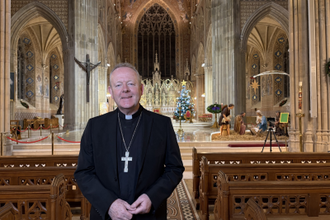Joseph Victor Edwin SJ speaks on Interculturality in India

Joseph Victor Edwin SJ
Joseph Victor Edwin SJ, who serves as a lecturer of Theology and Christian-Muslim Relations at the Vidyajyoti Institute of Religious Studies in Delhi, shared his thoughts on 'Interculturality in Indian Contexts' on August 23, 2024, online for the faculty, students, and supporters of the Institute of Mater Dei (IMD) in Goa. This presentation was part of the ongoing series on 'Intercultural Fellowships and Wellbeing' organized at IMD.
The evening program commenced with a welcome from Sr Julie, the superior of IMD. She emphasized the importance of harmonious interaction between people of diverse traditions, dialogue, and peaceful coexistence among people of different religions in today's global religious landscape. Dr Sr Stell Balthasar, the program coordinator, emphasized the concept of unity coexisting within diversity, stating that all beings are interconnected through the divine energy present in the universe. She highlighted the core realization of unity within diversity as a consistent pursuit within our hearts and souls.
Edwin started his presentation by briefly defining the terms "multicultural" and "cross-cultural" before delving into the concept of "interculturality." In multicultural societies, he said, different cultural groups coexist in apparent harmony, but often without truly understanding one another. Such societies lack cohesion and can harbour underlying prejudices and biases that, when provoked, could lead to serious conflicts. Edwin cited the recent unrest in the UK as an example, where unfounded rumours about a Muslim asylum seeker in the tragic killing of three children resulted in over 1,000 arrests and nearly 600 charges related to far-right riots across England and Northern Ireland, causing attacks on mosques, refugee centers, and Muslim healthcare workers.
On the other hand, "cross-cultural" studies involve the comparison of different cultures. In cross-cultural communication, differences are recognized and respected. This understanding can lead to individual perspective shifts and openness to better understanding between people, although it may not spark a collective transformation. Cross-cultural studies often consider one culture as the standard by which all others are assessed and juxtaposed.
Intercultural studies or Intercultural training play a pivotal role in fostering deep respect and profound understanding of diverse cultures. Intercultural communication emphasises the reciprocal exchange of ideas and cultural norms, aiming to nurture and strengthen profound relationships. In an intercultural society, individuals undergo transformative experiences as they learn and grow from their interactions, leading to a rich tapestry of shared knowledge and understanding.
India is a beautiful bouquet of diverse cultures, languages, religions, and traditions, and is more than just a 'multicultural' nation. Over the centuries people of diverse cultural and religious traditions interacted harmoniously. The Constitution of India unites us as one nation and celebrates the harmonious coexistence of various cultures and the value of diversity. However, the presence of prejudices, biases, and narrow-mindedness threatens to undermine the unity and strength of our nation.
India should strive to foster a culture of 'interculturality'. As Edwin highlighted, interculturality thrives on dialogue among people from different backgrounds. It is a dynamic process in which individuals from diverse cultures engage in interactions to understand and challenge their own and others' cultures. This can lead to potential cultural changes, while also promoting mutual respect and recognizing human rights.
Edwin pointed out that in the writings of Plato, Plato dramatized discussions in philosophy, in the form of Dialogue in which he used Socrates as his principal character. In the aftermath of two world wars, European philosophers introduced Dialogue as a fundamental human activity. In the Papal Magisterium, the word 'dialogue' appears for the first time in the inaugural Encyclical of St Pope Paul VI, Ecclesiam Suam (1964).
Based on Felix Körner SJ's work 'Political Religion: How Christianity and Islam Shape the World' (Paulist Press, 2020), Edwin pointed out that interpersonal relations are more than just conversation; it involves the dynamics of conversing. This relationship has four key characteristics: Encounter, where one attentively considers the other, embracing differences with curiosity and respect; Dependence, where each "I" owes itself to a "thou"; Honesty, the risk of fully revealing oneself to the other; and Reconciliation, an approach opposed to combativeness.
The gathering was filled with vibrant discussions, where participants passionately shared their perspectives and sought clarifications. It was a deeply profound experience of cultural exchange and understanding. We recognized the immense value of such meetings and eagerly look forward to more of such enriching moments in the future. The session concluded with an inspiring message from Sr Nirmalini, CRWI President, highlighting the significance of interfaith collaboration in line with the Synod on Synodality. Her words served as an invitation for us to walk together, learn from one another, respect different beliefs, and collectively embrace the diversity of religions. Moreover, the delightful musical arrangements by Mr and Mrs Walter Fernandez added an extra layer of enjoyment to our gathering.


















